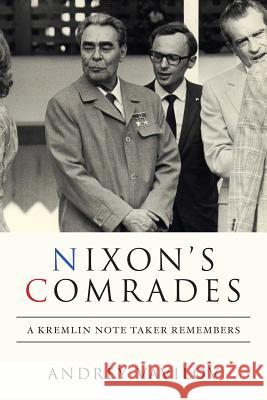Nixon's Comrades: A Kremlin Note Taker Remembers » książka
Nixon's Comrades: A Kremlin Note Taker Remembers
ISBN-13: 9781539984511 / Angielski / Miękka / 2016 / 340 str.
Andrey Vavilov looks back on his unique experience at the side of Leonid Brezhnev and Richard Nixon, Cold War rivals who became architects of detente. He provides a personal view as a direct participant of US-USSR super power summit conferences of the 1970s, where the he took notes and interpreted for Soviet leaders in their secret discussions with Richard Nixon and Henry Kissinger, and later with Gerald Ford and Jimmy Carter. "Nixon's Comrades" draws on the author's notes, recollections and private sources. An expert in transcribing diplomatic history, the author analyzes the gravitational attraction of Nixon's Imperial Presidency and Brezhnev's One-Party State, and highlights both leaders' dedication to their countries' interests, extraordinary tenacity, fierce loyalties and eccentricities. He reveals unpublicized facts about the "special relationship" with the USSR and with Leonid Brezhnev, which Nixon hoped would ensure his political survival while battling Watergate. He explains why Nixon and Kissinger barred American interpreters from sensitive conversations with his "Soviet Comrades" and placed trust on Russian staff; how they manipulated the American bureaucracy and achieved effectiveness with Brezhnev; why the White House concealed the Soviet leader's failing health; what Brezhnev really thought of the two men; and the Kremlin's miscalculation about Watergate. Andrey Vavilov suggests that US National Security Council staff clandestinely tape-recorded Nixon's meetings with Soviet leaders without their knowledge, even after the shutdown of the compromised White House taping system. The description of the tense - but often lighthearted - atmosphere of confidential encounters in the Kremlin and Crimea, Camp David and San Clemente, Geneva, Helsinki and Vienna is a welcome addition to declassified documents and published testimonials. The story will help researchers, diplomats and students of contemporary history, as well as the general reader, appreciate the salient points of tough debates on Vietnam, nuclear weapons, the Middle East, European security and Jewish emigration. They are the background for a frank portrayal of American and Russian negotiators, including Henry Kissinger and Foreign Minister Andrei Gromyko. The remarkably candid conversations and incidents the author witnessed add color to the personages encountered during his long diplomatic career, which continued after the traumatic collapse of the USSR and the change in the strategic balance."
Zawartość książki może nie spełniać oczekiwań – reklamacje nie obejmują treści, która mogła nie być redakcyjnie ani merytorycznie opracowana.











